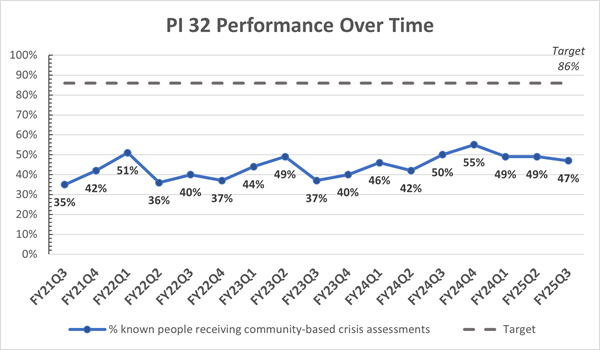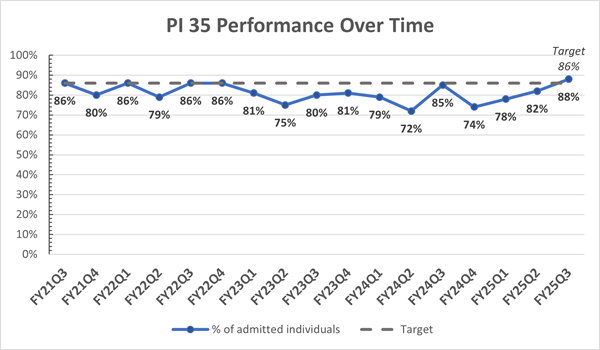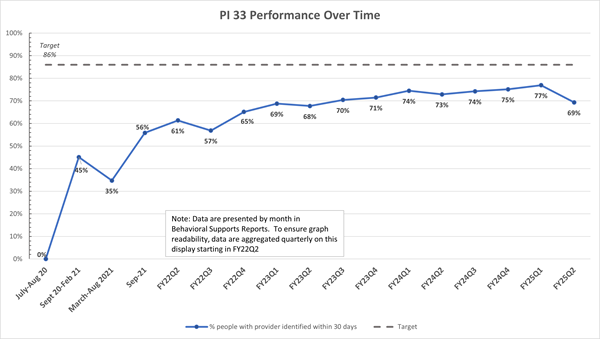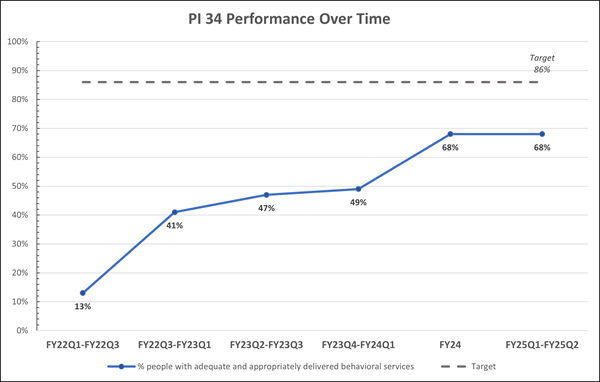Permanent Injunction
- 32. The Commonwealth will work to achieve a goal that 86% of children and adults receive crisis assessments at home, the residential setting, or other community setting (non-hospital/non-CSB office). Crisis Receiving Centers (“CRC”) will only be counted as an “other community setting” after it is determined that the individual or supported decision maker was not directed by the Call Center, Emergency Services, or Mobile Crisis staff to present at a CRC. To achieve that goal, the Commonwealth will take the following actions:
- DBHDS will continue to promote the use of the 988 24-hour crisis helpline by providing information on the helpline on its social media platforms, in print and television advertisements, and through informational bulletins developed or funded by DBHDS. DBHDS will require all mobile crisis team members to receive training within 90 days of hire on how to support and respond to individuals with developmental disabilities (DD) who are in crisis.
- DBHDS will maintain its current efforts to assist the regions in filling vacant mobile crisis positions by discussing staffing at regional qualitative reviews of REACH programs and supporting REACH programs to implement quality improvement plans.
- Within 6 months of the date of this Order, the Commonwealth will develop a plan that includes measurable goals, specific support activities, and timelines for implementation with consultation from stakeholders to enhance 988 supports and services to increase the likelihood that individuals will be assessed in the community.
- From the date of this Order, DBHDS will monitor staffing at each REACH program to determine if they have sufficient staffing per shift to meet the goal, including through discussion and review of filled/vacant positions, utilization rates of mobile crisis, and times mobile crisis calls are being received in comparison to the number of staff working during those hours at each REACH program’s quarterly review. If a quarterly review indicates that staffing is not sufficient to meet the goal, DBHDS shall review the region’s current efforts to increase staffing and, if DBHDS determines necessary, will require a quality improvement plan that includes additional actions that DBHDS finds are necessary to enhance staffing. The Independent Reviewer, in the reports required under Paragraph 76, shall include a determination in his report on the adequacy of the Programs and Virginia’s response to this requirement.
- Semi-annually, beginning on January 1 and June 1 of each year, DBHDS will work with the two regions that are experiencing the most success in responding to people in crisis in the community to determine what is leading to their success. DBHDS will work with the two regions that are experiencing the most challenges in responding to people in crisis in the community to learn what is leading to those challenges. DBHDS will work with all the regions based on these lessons learned to implement a plan to improve performance in each of the regions.
- If the Commonwealth has not achieved the goal within two years of the date of this Order after taking the actions in Paragraphs 32(a) through 32(e), DBHDS will conduct a root cause analysis and implement a QII as determined appropriate by DBHDS. As part of the root cause analysis, the Commonwealth will collect data on why individuals with developmental disabilities presented at a CRC instead of accessing mobile crisis services. DBHDS will continue this quality improvement process until the goal is achieved and sustained for one year.
- 33. The Commonwealth will work to achieve a goal that 86% of individuals identified as in need of Therapeutic Consultation service are referred for the service and have a provider identified within 30 days. To achieve that goal, the Commonwealth will take the following actions:
- Within 12 months of the date of this Order, DBHDS shall implement a technical assistance initiative with the CSBs that need the most support to connect people to behavioral supports and focus on improving case managers’ awareness of the behavioral resources available to individuals in need of Therapeutic Consultation, unique CSB business practices, and supervisory support for case managers in this area of performance.
- Annually, the Commonwealth will participate in at least one regional event and at least one statewide conference to promote Therapeutic Consultation services. The Commonwealth will provide technical assistance to providers regarding enrollment with Medicaid as a provider as they reach out to the Commonwealth for this support.
- By July 1, 2025, the Commonwealth will create a training about enrolling with Medicaid as a Therapeutic Consultation provider and make it available for providers via DBHDS’s website.
- If the Commonwealth has not achieved the goal as reported in its status update of December 1, 2024, and has not conducted a rate study meeting the requirements of Paragraph 59 in the preceding two years, the Commonwealth will initiate a rate study of Therapeutic Consultation by January 1, 2025. The rate study shall be completed in time to be considered during the 2026 legislative session. If the Commonwealth has not achieved the goal as reported in its status update of December 1, 2028, and has not conducted a second rate study meeting the requirements of Paragraph 59, the Commonwealth will initiate a second rate study of Therapeutic Consultation by January 1, 2029. The rate study shall be completed in time to be considered during the 2030 legislative session. Any rate study required by this paragraph shall be conducted in accordance with Paragraph 59. This paragraph shall not be construed to require the Commonwealth to conduct more than two rate studies.
- If the Commonwealth has not achieved the goal by June 30, 2026 after taking the actions in Paragraphs 33(a) through 33(c), DBHDS will also conduct a root cause analysis and implement a QII as determined appropriate by DBHDS. DBHDS will continue this quality improvement process until the goal is achieved and sustained for one year.
Settlement Agreement
III.C.6.a.i – iii
The Commonwealth shall develop a statewide crisis system for individuals with intellectual and developmental disabilities. The crisis system shall:
i. Provide timely and accessible support to individuals with intellectual and developmental disabilities who are experiencing crises, including crises due to behavioral or psychiatric issues, and to their families;
ii. Provide services focused on crisis prevention and proactive planning to avoid potential crises; and
iii. Provide in-home and community-based crisis services that are directed at resolving crises and preventing the removal of the individual from his or her current placement whenever practicable.
About Crisis System
The Commonwealth of Virginia embarked on a mission to transform the existing crisis system. The vision of this crisis system transformation is to develop a community-based, trauma-informed, recovery-oriented crisis system that will respond to a crisis where it is occurring rather than relying on the local emergency department or law enforcement as the primary way to access crisis care. This is an all-inclusive system no matter the disability or age of the person with the goal of supporting the individual and their natural support system to meet their needs by linking to the appropriate level of care to stabilize the crisis and prevent further crisis cycles. This transformation of the crisis system would align the Commonwealth’s statewide crisis system with national best practice standards around crisis services. The Commonwealth established the Crisis Office in June of 2021 and further expanded to a Division of Crisis Services on 7/1/2022.
The REACH program (Regional Education Assessment Crisis Services Habilitation) is a part of this crisis system and was established as a statewide crisis system of care that serves individuals diagnosed with a developmental disability (DD). This system is designed to meet the crisis support needs of individuals who have a developmental disability and are experiencing crisis events that put them at risk for homelessness, incarceration, hospitalization, and/or danger to themselves or others. REACH programs offer an additional layer of support to Emergency Services, the state hospital system, and caregivers who work the most closely with individuals with a developmental disability (DD). The REACH program offers mobile crisis response, community crisis stabilization both residential and non-residential, prevention services, and community training. For individuals who avail themselves of REACH services, staff create Crisis Education and Prevention Plans (CEPP) and provide training on this plan to the individual and caregiver. The CEPP is an individualized, client-specific written document that provides a concise, clear, and realistic set of supportive interventions to prevent or de-escalate a crisis and assist an individual who may be experiencing a behavioral loss of control.
To foster proactive and preventative referrals to the REACH program, DBHDS initiated the Crisis Risk Assessment Tool (CAT) in FY21Q1. This tool and associated training are currently being utilized throughout CSBs/BHA in the Commonwealth.
This page also provides information on behavior support planning, which is included under the overarching crisis provisions and compliance indicators in the Settlement Agreement.
Trend Data
Performance Indicator 32 Language:
The Commonwealth will work to achieve a goal that 86% of children and adults receive crisis assessments at home, the residential setting, or other community setting (non-hospital/non-CSB office).

Performance Indicator 35 Language:
The Commonwealth will work to achieve a goal of 86% of individuals with a DD waiver and known to the REACH system who are admitted to a CTH or a psychiatric hospital have a community residence identified within 30 days of admission.

Performance Indicator 33 Language:
The Commonwealth will work to achieve a goal that 86% of individuals identified as in need of Therapeutic Consultation service are referred for the service and have a provider identified within 30 days.

Performance Indicator 34 Language:
The Commonwealth will work to achieve a goal that 86% of individuals with identified behavioral support needs are provided adequate and appropriately delivered behavioral support services.

Authorizing Authority
Budget Bill – H.B. 1500 (Chapter 806), 2013 Sess. (Va. 2013), Item 315.Y
Delegation
Processes, Protocols and Standards
Guidelines, Charters, Plans
Instruments and Tools
- Crisis Education and Prevention Plan
- Crisis Stabilization Admission Checklist
- Prevention and Stepdown Admission Checklist
- REACH Program Data Collection Tool
- Crisis Risk Assessment Tool (CAT)
- Behavior Support Plan Adherence Review Instrument (BSPARI)
Training Materials
For more information about the Crisis System, visit: DBHDS REACH Program Crisis Supports for Youth and Adults with Developmental Disabilities
For more information about behavioral services and behavior support planning under the DD waivers, visit: DBHDS Behavioral Services Information